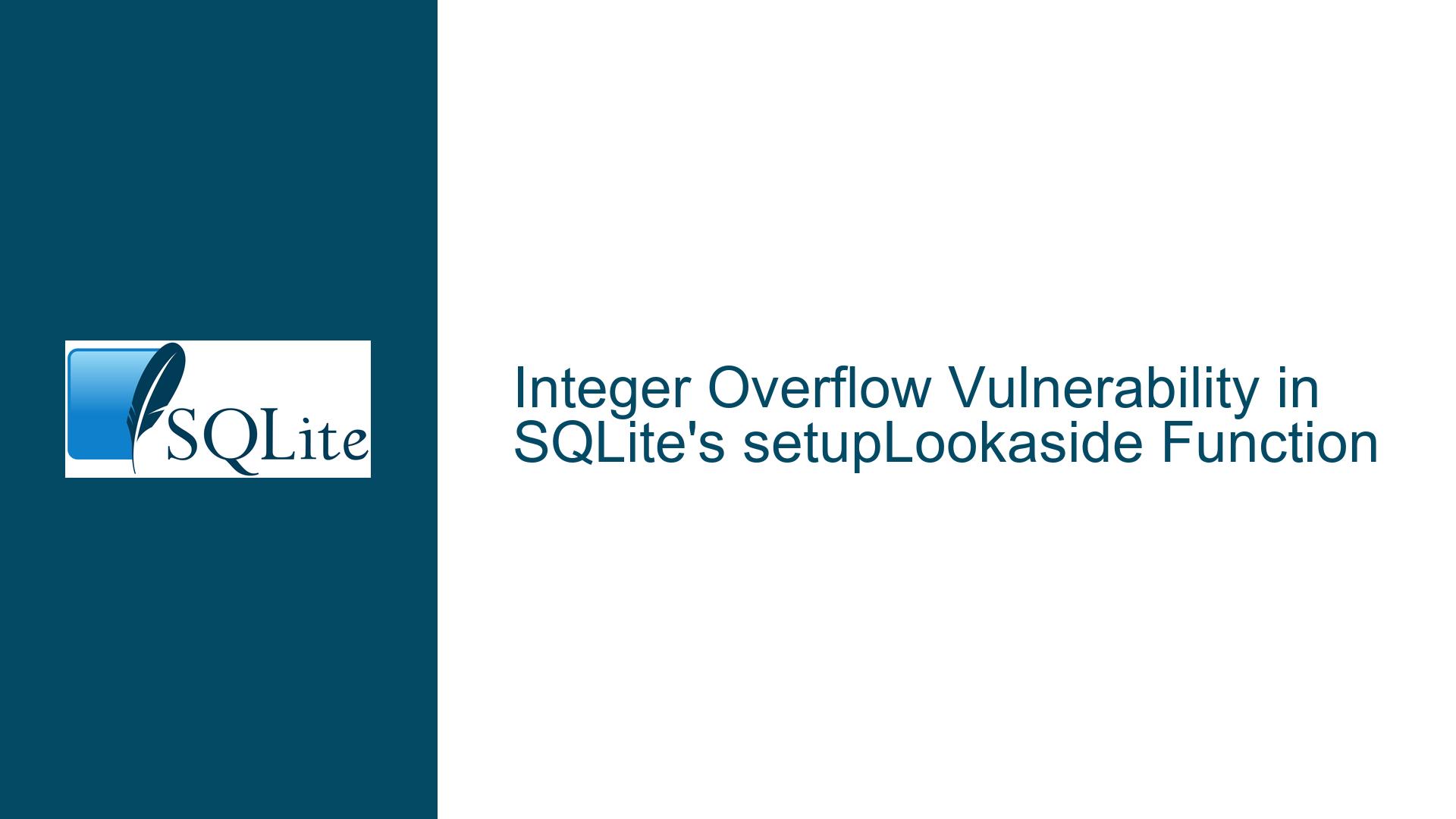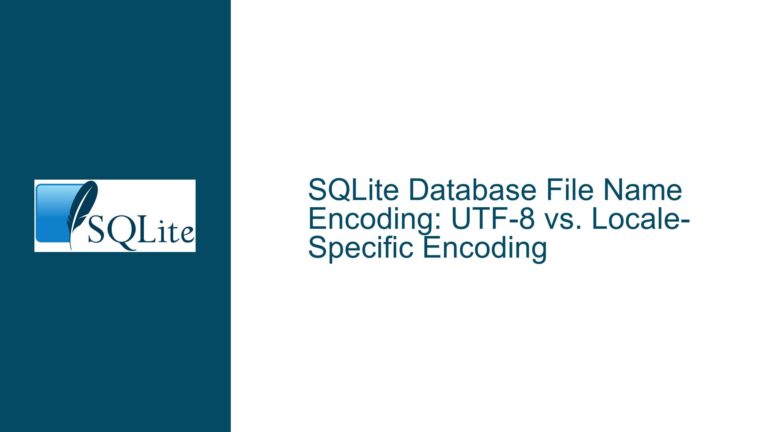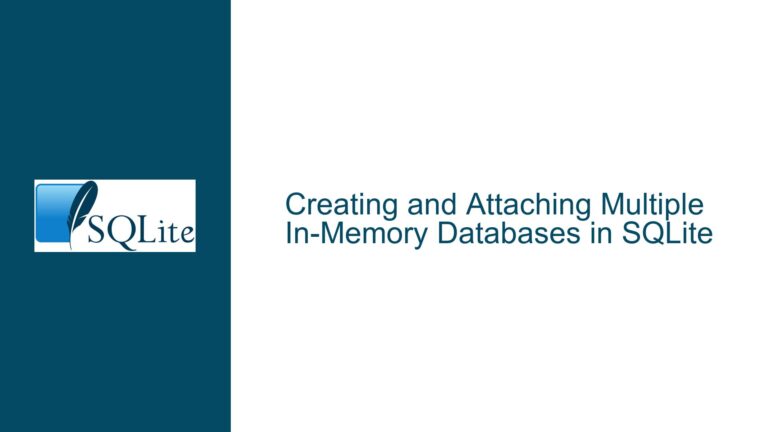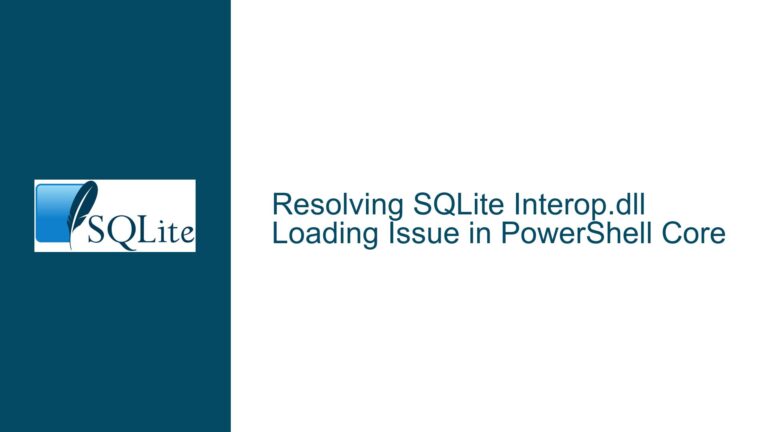Integer Overflow Vulnerability in SQLite’s `setupLookaside` Function
Integer Overflow in setupLookaside Function During Memory Allocation
The setupLookaside function in SQLite is responsible for dividing a pre-allocated memory buffer into large and small memory chunks for efficient memory management. This function is critical for optimizing SQLite’s performance, particularly in scenarios where frequent small memory allocations are required. However, a critical integer overflow vulnerability has been identified in the calculation of the number of small memory blocks (nSm). This vulnerability arises due to insufficient type casting during arithmetic operations, specifically when calculating the product of sz (the size of a lookaside buffer block) and nBig (the number of large memory blocks). The overflow occurs when the product of sz and nBig exceeds the maximum value that can be stored in a standard integer type, leading to incorrect memory allocation and potential security risks.
The issue manifests when the user-defined parameters sz and cnt (the number of lookaside buffer blocks) are large enough to cause the intermediate calculations to exceed the bounds of a 32-bit integer. For example, when sz = 1200 and cnt = 2,500,000, the calculation of sz * nBig overflows, resulting in an incorrect value for nSm. This can lead to memory corruption, application crashes, or even exploitable vulnerabilities such as arbitrary memory writes or remote code execution.
The root cause of this issue lies in the lack of type casting for the intermediate result of sz * nBig. While the initial calculation of szAlloc (the total memory to be allocated) is correctly cast to sqlite3_int64 to prevent overflow, the subsequent calculation of nSm does not apply the same precaution. This oversight allows the integer overflow to propagate, leading to incorrect memory allocation and potential security vulnerabilities.
Insufficient Type Casting in Intermediate Arithmetic Operations
The integer overflow vulnerability in the setupLookaside function is primarily caused by insufficient type casting during intermediate arithmetic operations. Specifically, the calculation of nSm involves the expression (szAlloc - sz * nBig) / LOOKASIDE_SMALL, where szAlloc is the total memory to be allocated, sz is the size of a lookaside buffer block, nBig is the number of large memory blocks, and LOOKASIDE_SMALL is a constant representing the size of a small memory block (128 bytes).
The issue arises because the product sz * nBig is not cast to sqlite3_int64 before the subtraction and division operations. As a result, when sz and nBig are large, the product sz * nBig can exceed the maximum value that can be stored in a 32-bit integer, causing an overflow. This overflow leads to an incorrect value for nSm, which in turn causes the function to allocate an incorrect number of small memory blocks.
For example, consider the case where sz = 1200 and cnt = 2,500,000. The total memory to be allocated (szAlloc) is calculated as sz * cnt = 1200 * 2,500,000 = 3,000,000,000, which is within the range of a 64-bit integer. However, the calculation of nBig results in nBig = 1,893,939, and the subsequent calculation of sz * nBig yields 1200 * 1,893,939 = 2,272,726,800. Without proper type casting, this product exceeds the maximum value of a 32-bit integer (2,147,483,647), causing an overflow. The overflow results in an incorrect value for nSm, which is used to allocate small memory blocks.
The lack of type casting in this critical calculation is the primary cause of the integer overflow vulnerability. This issue is exacerbated by the fact that the setupLookaside function is often used in high-performance scenarios where large memory allocations are common, increasing the likelihood of encountering this bug.
Implementing Proper Type Casting and Memory Allocation Validation
To address the integer overflow vulnerability in the setupLookaside function, it is necessary to implement proper type casting and memory allocation validation. The primary fix involves casting the intermediate result of sz * nBig to sqlite3_int64 before performing the subtraction and division operations. This ensures that the calculation of nSm is performed using 64-bit arithmetic, preventing the overflow.
The recommended fix is to modify the calculation of nSm as follows:
nSm = (szAlloc - sz * (sqlite3_int64)nBig) / LOOKASIDE_SMALL;
This modification ensures that the product sz * nBig is cast to sqlite3_int64 before the subtraction and division operations, preventing the integer overflow.
In addition to the type casting fix, it is also advisable to implement additional validation checks to ensure that the calculated values for nBig and nSm are within reasonable bounds. This can be done by adding assertions or runtime checks to verify that the values do not exceed the maximum allowable memory allocation size. For example:
assert(nBig >= 0 && nBig <= MAX_ALLOWED_BLOCKS);
assert(nSm >= 0 && nSm <= MAX_ALLOWED_BLOCKS);
These checks help to catch potential issues early and prevent memory allocation errors that could lead to crashes or security vulnerabilities.
Furthermore, it is important to review the overall memory allocation strategy in the setupLookaside function to ensure that it is robust and resilient to edge cases. This includes verifying that the user-defined parameters sz and cnt are within reasonable limits and that the total memory allocation does not exceed the available system memory. Implementing these additional safeguards helps to mitigate the risk of memory-related vulnerabilities and ensures the stability and security of the SQLite database.
In conclusion, the integer overflow vulnerability in the setupLookaside function is a critical issue that requires immediate attention. By implementing proper type casting and memory allocation validation, it is possible to prevent the overflow and ensure the correct allocation of memory blocks. These fixes not only address the immediate security concern but also enhance the overall robustness and reliability of the SQLite database.






